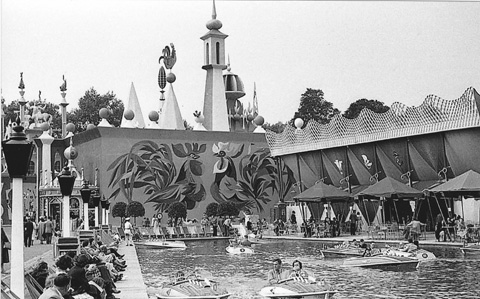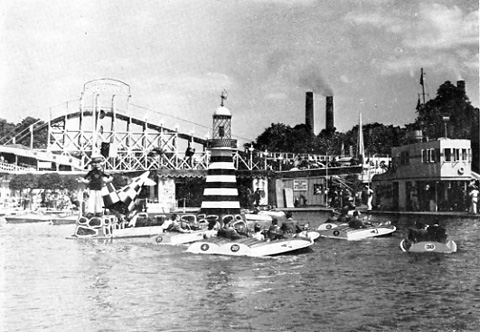|
|
|
| HOME ARTICLES GALLERIES ABOUT US FORUM LINKS CONTACT JOYLAND BOOKS | |
|
BATTERSEA FESTIVAL GARDENS 1951 (PAGE 1 OF 5) by Phil Gould Article: Added May 2011 |
|
|
The Second World War may have been over but a few years on and
the country was still in the grip of austerity, there was a
housing shortage and drabness seemed to surround people who
could only buy utility clothes and furnishings. Clement Attlee’s
Labour government agreed to do something which would act as a
’tonic to the nation’. This would come in the form of an
exhibition which would celebrate all that was great and good
about Britain. The event would open for business exactly 100
years after the Great Exhibition of 1851. It was the brainchild
of Gerald Barry and the Labour Party’s Deputy Leader Herbert
Morrison. Barry declared: ‘1951 should be a year of fun, fantasy
and colour.’
|
|
|
While
events would take place all around the country the
main focus of the Festival of Britain would be on
two sites in London. On the South Bank, between
Westminster and Waterloo bridges, and three miles
upstream at Battersea. The former would house the
serious side of the festival and would be divided
into two areas - The Land and The People. Battersea
was to be home to the more frivolous side of the
celebration and include a large amusement park among
its attractions. Designed along the lines of
Copenhagen’s famous Tivoli Gardens it also harked
back to the English pleasure gardens of the 17th
century and featured a Riverside Theatre, Dance
Pavilion, Punch and Judy theatre, bars and cafes.
Even before work started on the Battersea site there was opposition from Lord Beaverbrook’s press and Conservative MPs who believed that spending money on Pleasure Gardens was ludicrous given all the other places and organisations crying out for financial aid at that moment in history. In the years leading up to 1951 the project became something of a political football. The London Evening Standard printed a leader declaring ‘Spend the money on St Thomas’ Hospital’ which had been bombed. Following initial criticism the Festival Gardens project was shelved for a year but then given the green light. However, it only had half of the budget that had been originally allocated. This resulted in many of the attractions at Battersea being sponsored. The Festival Committee realised that in order to guarantee that the crowds would visit Battersea they needed to have some spectacular new fairground attractions. With little investment being made by British showmen post-war the committee decided to look across the Atlantic for inspiration. In order to buy the new American amusements in 1950 the committee applied to the Treasury for, and astonishingly received, £30,000. It was decided that they would take a number of British showmen on the trip to the States. If the showmen found attractions they were interested in the Committee would purchase them and then the showmen would be allowed to buy them at cost plus transport costs, avoiding import duties and purchase taxes. Unsurprisingly they wanted the trip to be kept ’very hush hush’. But the press, Conservative Mps and other political groups found out about the planned trip. Questions were raised in Parliament, the Daily Mail ran headlines asking why the Government could spend thousands of dollars on a new roundabout and the Nottingham Housewives Association sent a telegram to the Ministry of Food demanding to know why if dollars weren’t available to buy eggs and other food why were they available to be spent on fairground rides. Despite all of this the venture went ahead and no less than seven new rides were to make their debut by the end of the Festival Gardens first year of operation. Despite such opposition The World’s Fair carried regular updates on the proposed event and even carried lists of tenants for the amusement park. |
|
|
|
|
|
THEMAGICEYE | Terms and Conditions | Privacy Policy | Contact Us |
|


